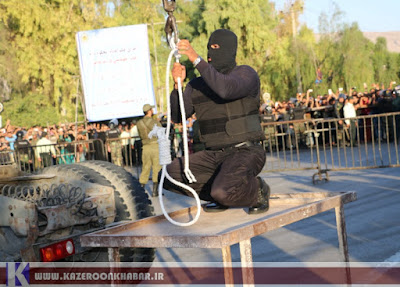 |
| Iran: Medieval and barbaric punishments |
Six prisoners were executed for drug charges in Karaj (west of Tehran) Thursday morning Dcember 15.
According to Iran Human Rights (IHR) sources, 5 of the prisoners were hanged in the Central Prison of Karaj. The prisoners are identified as Behzad Lazemi, Mostafa Gholami, Fardin Sabzi, Mehdi Kaeni and Saeed Faramarzi from the sections 4, 5, 2, 3 and 3 respectively.
On Wednesday IHR reported about the transfer of 4 of these prisoners for execution.
The website of the Human Rights Activists News Agency (HRANA) reported about the execution of one prisoner on Wednesday December 14. The prisoner who was identified as Mohammad Hossein Beheshti was charged with possession of drugs.
A source close to Mohammad Hossein said that besides being sentenced to death for drug offences, he had also been held in Rajaishahr prison for 23 years charged with murder. But the execution was for his drug charges.
Drug related executions continue in Iran despite the fact that the Iranian Parliament recently passed a law with the aim of limiting the use of the death penalty for drug charges. The law has to be approved by the Guardian Council and it is not clear whether t will actually lead to a reduction in the number of drug related executions.
A prisoner sentenced to death on drug related charges was reportedly executed at Bandar Abbas Central Prison (Hormozgan province, southern Iran) on Thursday December 15, according to close sources.
Close sources identify the prisoner as 39-year-old Behzad Salimkord. About 4 years ago, Mr. Salimkord was sentenced to death by branch 2 of the Revolutionary Court in Bandar Abbas for the charge of possessing and trafficking 2 kilograms of crystal meth and 250 grams of opium.
Mr. Salimkord was reportedly transferred to solitary confinement 2 days ago in preparation for his execution, and was permitted a visit with his wife and 2 young children.
"Behzad worked in a brick factory for 11 years to pay off the house we lived in. He eventually lost his job and we weren't able to pay for the house for 3 months, so he went to Bandar Abbas to find work. Behzad said that the drugs he was charged for weren't his. Behzad didn't even smoke cigarettes. He hated drugs. Nonetheless, they executed him on drug charges," says a relative of Mr. Salimkord.
Iranian official sources, including the media and Judiciary, have been silent on Behzad Salimkord's execution.
Iran Human Rights (IHR) has received reports from local sources about the execution of two other prisoners at Bandar Abbas Central Prison this week. However, IHR has not been able to confirm these reports at this time.
Secret executions for drug related charges continue in Iran even though the Iranian Parliament recently passed a law to want to limit the use of the death penalty for drug charges. The law has to be approved by Iran's Guardian Council, and it is not clear whether it will actually lead to a reduction in the number of drug related executions. Additionally, members of parliament recently wrote a letter to the head of the Judiciary calling for the execution of about 5,000 prisoners sentenced to death on drug related charges to be quashed pending investigation into their charges.
Source: Iran Human Rights, December 17, 2016
⚑ | Report an error, an omission; suggest a story or a new angle to an existing story; submit a piece; recommend a resource; contact the webmaster, contact us: deathpenaltynews@gmail.com.
Opposed to Capital Punishment? Help us keep this blog up and running! DONATE!


0 nhận xét:
Post a Comment